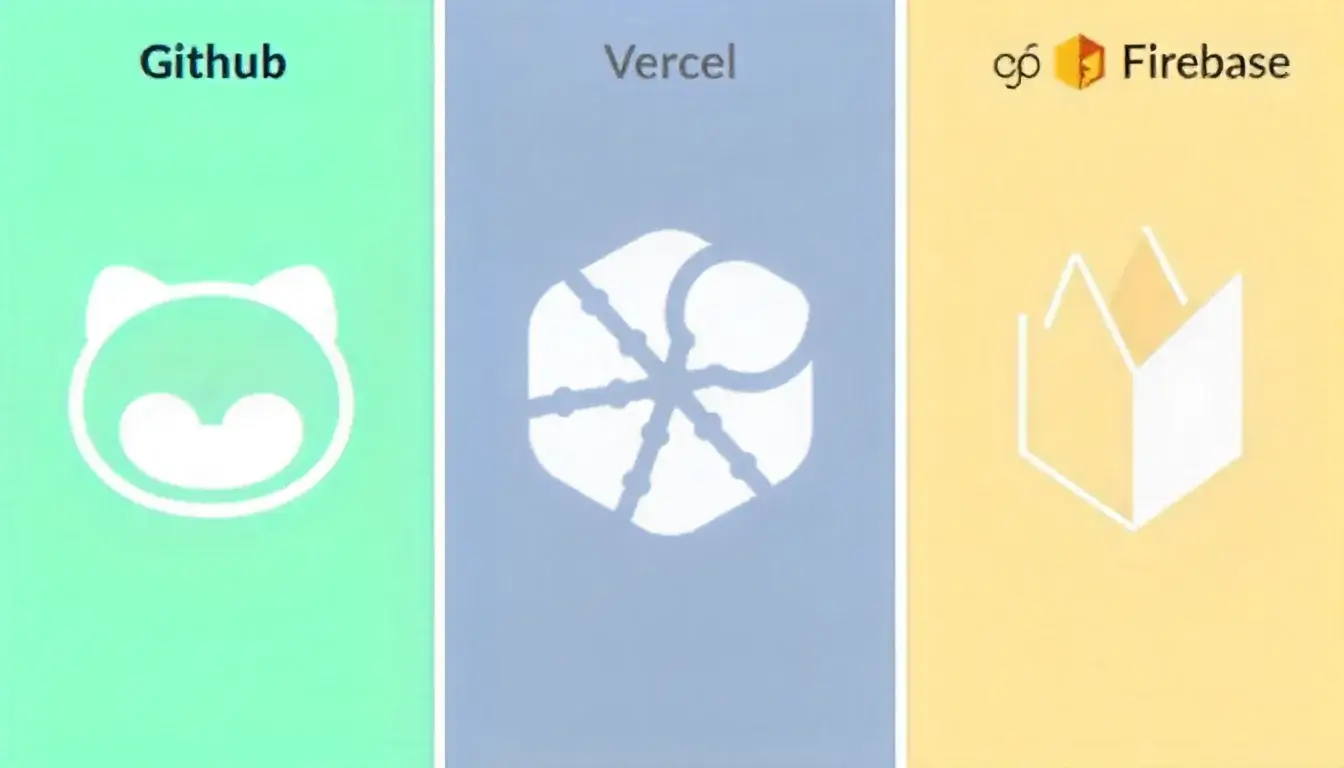Choosing the right hosting platform can make or break your development workflow. In 2025, developers have multiple free hosting options such as GitHub Pages, Vercel, and Firebase Hosting. Each offers unique benefits — from seamless Git integration to modern deployment pipelines.
This guide breaks down GitHub Hosting vs Vercel vs Firebase, helping you understand which platform provides the best value, scalability, and developer experience for your projects.
Introduction: The Growing Need for Free Git Hosting
As more developers, startups, and indie creators build web apps and portfolios, the demand for free Git hosting solutions continues to rise. Hosting services that integrate with Git repositories simplify collaboration, version control, and continuous deployment — key factors in today’s agile development environment.
Platforms like GitHub, Vercel, and Firebase dominate the scene by offering free hosting tiers, robust developer tools, and automated workflows. But which one truly delivers the best mix of speed, reliability, and scalability?
This detailed comparison will walk you through:
- The features of GitHub Hosting, Vercel, and Firebase
- Their advantages and limitations
- How each handles free Git hosting and deployment
- And which platform best suits your use case
What Is Free Git Hosting?
Before comparing the platforms, let’s define free Git hosting.
Free Git hosting refers to online platforms that allow developers to store, manage, and deploy code repositories using Git version control, without paying for basic usage. These services often include:
- Repository hosting (for code management)
- Static or dynamic site deployment
- Free SSL and custom domain support
- CI/CD integration
The top players — GitHub, Vercel, and Firebase — each implement these features differently.
GitHub Hosting: The Developer’s Foundation
Overview
GitHub Hosting (GitHub Pages) is one of the most popular ways to host static websites directly from your GitHub repository. It’s especially ideal for personal portfolios, documentation, and static project sites.
Key Features
- Completely free for public repositories
- Automatic deployment from your GitHub repo
- Supports custom domains and HTTPS
- Jekyll integration for static site generation
- Unlimited bandwidth for open-source use cases
Advantages
- Perfect for developers already using GitHub for version control
- No need for third-party integrations
- Excellent for blogs, resumes, and documentation
- Fully Git-driven workflow (push = deploy)
Limitations
- Doesn’t support server-side code (Node.js, Python, etc.)
- No built-in database or backend functionality
- Limited CI/CD capabilities for complex web apps
Ideal For
- Static websites
- Developer portfolios
- Open-source documentation
Vercel: The Modern Cloud for Frontend Developers
Overview
Vercel is designed for modern web developers, offering seamless integration with frameworks like Next.js, React, and Vue. Its Git-based deployment process makes it an appealing choice for developers seeking fast, automated hosting.
Key Features
- Free tier with generous limits
- Automatic builds from GitHub, GitLab, or Bitbucket
- Custom domains with SSL
- Serverless functions and edge deployment
- Instant rollbacks and preview deployments
Advantages
- Ideal for modern frameworks and full-stack projects
- Continuous deployment directly from Git repositories
- Supports backend API routes and dynamic rendering
- Integrated analytics and performance tools
Limitations
- Some advanced features require paid plans
- Build times are limited on free tier
- May be overkill for simple static sites
Ideal For
- React/Next.js developers
- Web apps needing backend logic
- Scalable frontend projects
Firebase Hosting: Google’s Solution for Web and Mobile Developers
Overview
Firebase Hosting by Google is a platform for hosting both static and dynamic web apps with global CDN support. It’s part of the Firebase ecosystem, integrating easily with Google Cloud and backend services like Firestore and Authentication.
Key Features
- Free tier available with Firebase Spark Plan
- Global CDN for fast delivery
- One-click deployment from CLI
- Automatic SSL
- Integration with Firebase Auth and Firestore
Advantages
- Excellent for web apps and mobile backends
- Real-time database support
- Scalable and production-ready
- Free SSL and hosting with Firebase CLI
Limitations
- Requires setup through Firebase Console and CLI
- Learning curve for beginners
- Limited bandwidth on free tier
Ideal For
- Progressive web apps (PWAs)
- Full-stack projects with authentication and data storage
- Mobile app backends
Comparison Table: GitHub Hosting vs Vercel vs Firebase
| Feature | GitHub Hosting | Vercel | Firebase Hosting |
|---|---|---|---|
| Free Plan | Yes | Yes | Yes |
| Git Integration | Native | Native | Via CLI |
| Supports Dynamic Apps | No | Yes | Yes |
| Serverless Functions | No | Yes | Yes |
| Custom Domain & SSL | Yes | Yes | Yes |
| Ideal Use Case | Static Sites | Web Apps | Mobile + Web Apps |
| Ease of Use | Beginner-Friendly | Intermediate | Intermediate |
| Performance | Good | Excellent | Excellent |
Performance and Scalability
When it comes to speed and scalability, both Vercel and Firebase edge out GitHub Hosting. Their global CDNs ensure minimal latency and fast page loads across continents. GitHub Pages is reliable but mainly designed for smaller-scale static sites.
For enterprise-grade scalability:
- Vercel excels with edge functions and Next.js optimization.
- Firebase supports real-time databases and server-side logic.
GitHub Pages remains unbeatable for simplicity and open-source documentation.
Pricing Comparison
All three platforms offer free hosting tiers, but differ in scalability:
- GitHub Pages: Always free for public repositories.
- Vercel: Free for personal projects; paid tiers add team features and analytics.
- Firebase: Free with bandwidth limits; pay-as-you-go for higher usage.
In 2025, these options remain cost-effective for small teams, students, and indie developers.
Developer Experience and Workflow Integration
Each platform integrates seamlessly with Git workflows, but differs in automation and control:
- GitHub Hosting: Easiest setup — commit and push to deploy.
- Vercel: Automatically deploys with pull requests, offering live previews.
- Firebase: Requires CLI commands but gives granular deployment control.
For collaborative teams, Vercel provides the best workflow visibility with deploy previews for every branch.
Security and Reliability
Security is critical for hosting in 2025.
All three platforms provide:
- Free SSL certificates
- Automatic HTTPS
- Version-controlled deployment
However, Firebase and Vercel include extra layers like:
- Automatic rollback on failed deployments
- Serverless environment isolation
- Edge network security
Which Platform Should You Choose in 2025?
Choose GitHub Hosting If:
- You need a simple, static site solution
- You want free hosting tied directly to your Git repo
- You’re building documentation or a personal portfolio
Choose Vercel If:
- You’re using modern frameworks (Next.js, React)
- You need fast, automated CI/CD
- You want serverless APIs and edge computing
Choose Firebase If:
- You’re building full-stack web or mobile apps
- You need authentication, database, and hosting in one package
- You prefer Google’s cloud ecosystem
Conclusion: The Future of Free Git Hosting
In 2025, free Git hosting platforms have evolved into full-featured cloud ecosystems. While GitHub Hosting remains the go-to choice for static projects, Vercel and Firebase lead for scalable, dynamic applications.
Your choice depends on your project’s complexity:
- For simplicity: GitHub Pages
- For modern web apps: Vercel
- For integrated backend solutions: Firebase
Each offers a generous free tier, making it easier than ever for developers to build, deploy, and grow without financial barriers.
Meta Description
Discover how GitHub Hosting, Vercel, and Firebase compare in 2025. Learn which free Git hosting platform offers the best mix of performance, scalability, and ease of use for developers and online projects.
 Coding Rhodes
Coding Rhodes 
 GitHub Pages vs. Netlify: Which Hosting Platform Should You Choose?
GitHub Pages vs. Netlify: Which Hosting Platform Should You Choose?